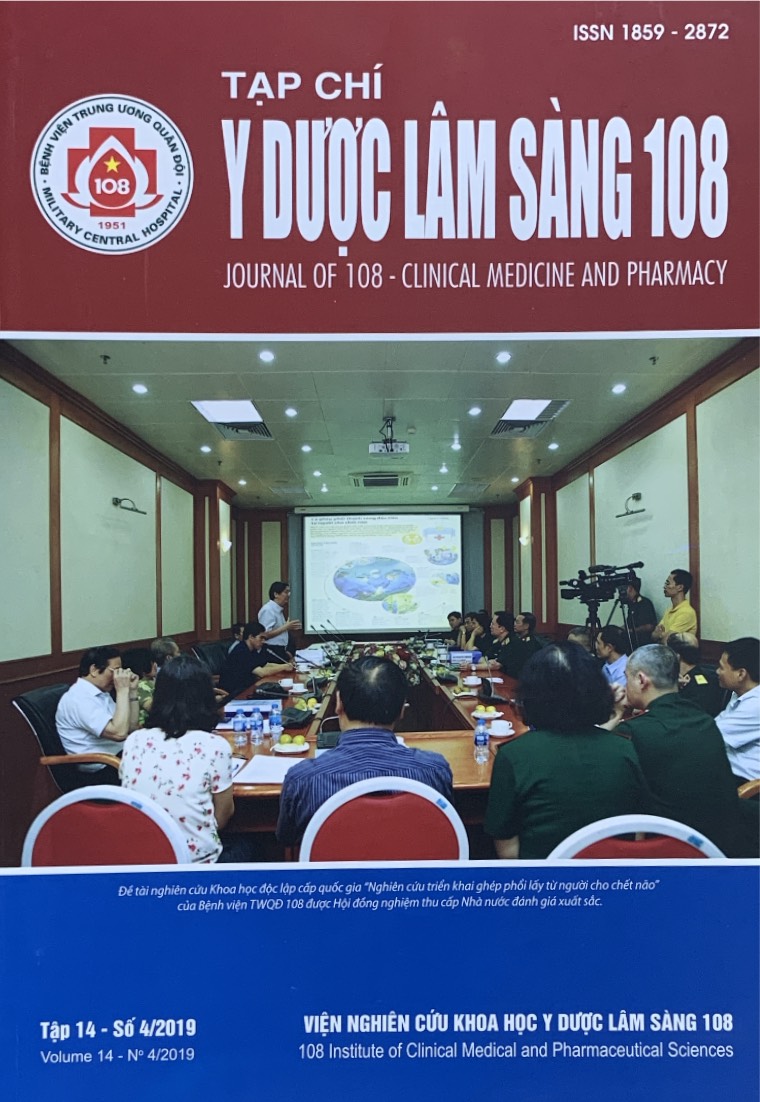Results of selective internal radiation therapy with SIR-Spheres for treatment of unresectable hepatocellular carcinoma
Main Article Content
Keywords
Abstract
Objective: To evaluate the efficiency of selective internal radiation therapy (SIRT) with Y-90 microspheres and determine prognostic factors that impacts on unresectable hepatocellular carcinoma (HCC) patients. Subject and method: The data of research included 97 patients who were diagnosed with unresectable HCC and had SIRT with Y-90 resin microspheres from October 2013 to March 2019. The study was designed as retrospective investigation. The survival of patients was assessed by utilizing the Kaplan-Meier method and estimate prognostic factors that affect the survival of these patients by using Log-rank test and Cox proportional hazards Regression. Radiologic response was evaluated with the modified response evaluation criteria in solid tumors (mRECIST) criteria. Result: Ninety-seven patients (90 male, mean age 60.4 ± 12.3 years) underwent SIRT, median clinical follow-up was 16.4 (1.8 - 62) months. The median survival after SIRT was 23.9 ± 2.4 months with a 36-month survival of 39.2%. Tumor response was accorded to mRECIST criteria followed-up beyond 6 months, a complete response (CR) to treatment was observed in 12 patients (18.8%), partial response (PR) in 23 (35.8%), stable disease (SD) in 8 (12.5%) and progressive disease (PD) in 21 (32.8%). Factors associated with longer overall survival (OS) included age over 65, Barcelona-Clinic Liver Cancer (BCLC) B, tumor size larger 10cm, tumor burden more 25%, tumor response (CR/PR). On multivariate analysis, a lack of bilobar disease and tumor response (CR/PR/SD) were predictors of longer OS. Conclusion: SIRT is effective treatment for unresectable HCC. The lack of bilobar disease prior to SIRT and tumor response (CR/PR/SD) are positive prognostic factors.
Article Details
References
2. Forner A et al (2014) Treatment of intermediate-stage hepatocellular carcinoma. Nat Rev Clin Oncol 11: 525-535.
3. Güney İB (2017) HCC locoregional therapies: Yttrium-90 (Y-90) selective internal radiation therapy (SIRT). Journal of Gastrointestinal Cancer 48(3): 276-280.
4. Kolligs FT et al (2015) Pilot randomized trial of selective internal radiation therapy vs. chemoembolization in unresectable hepatocellular carcinoma. Liver Int 35(6): 1715-1721.
5. Lencioni R, Llovet J (2010) Modified RECIST (mRECIST) assessment for hepatocellular carcinoma. Seminars in Liver Disease 30(01): 52-60.
6. Llovet JM et al (2008) Sorafenib in advanced hepatocellular carcinoma. N Engl J Med 359: 378-390.
7. Llovet JM, Bruix J (2003) Systematic review of randomized trials for unresectable hepatocellular carcinoma: Chemoembolization improves survival. Hepatology 37(2): 429-442.
8. Mantry PS et al (2017) Selective internal radiation therapy using yttrium-90 resin microspheres in patients with unresectable hepatocellular carcinoma: A retrospective study. J Gastrointest Oncol.
9. Mazzaferro et al (2013) Yttrium-90 radioembolization for intermediate-advanced hepatocellular carcinoma: A phase 2 study. Hepatology 57(5): 1826-1837.
10. Meyer C et al (2017) Yttrium-90 radioembolization of unresectable hepatocellular carcinoma - a single center experience. OncoTargets and Therapy, Volume 10: 4773-4785.
11. Ozkan ZG et al (2015) Favorable survival time provided with radioembolization in hepatocellular carcinoma patients with and without portal vein thrombosis. Cancer Biotherapy and Radiopharmaceuticals 30(3): 132-138.
12. Pitton et al (2014) Randomized comparison of selective internal radiotherapy (SIRT) versus drug-eluting bead transarterial chemoembolization (DEB-TACE) for the treatment of hepatocellular carcinoma. CardioVascular and Interventional Radiology 38(2): 352-360.
13. Sangro B, Inarrairaegui M, Bilbao JI (2012) Radioembolization for hepatocellular carcinoma. J Hepatol 56: 464.
14. Sangro B et al (2011) Survival after yttrium-90 resin microsphere radioembolization of hepatocellular carcinoma across Barcelona clinic liver cancer stages: a European evaluation. Hepatology 54: 868-878.
15. Saxena A et al (2014) Yttrium-90 radioembolization is a safe and effective treatment for unresectable hepatocellular carcinoma: A single centre experience of 45 consecutive patients. International Journal of Surgery 12(12): 1403-1408.
16. Salem R et al (2011) Radioembolization results in longer time-to-progression and reduced toxicity compared with chemoembolization in patients with hepatocellular carcinoma. Gastroenterology 140(2): 497-507.
17. Sirtex (2017) SIR-spheres® Y-90 resin microspheres substantially improves quality of survival in primary liver cancer. New Study against Standard Treatment Shows.
 ISSN: 1859 - 2872
ISSN: 1859 - 2872
